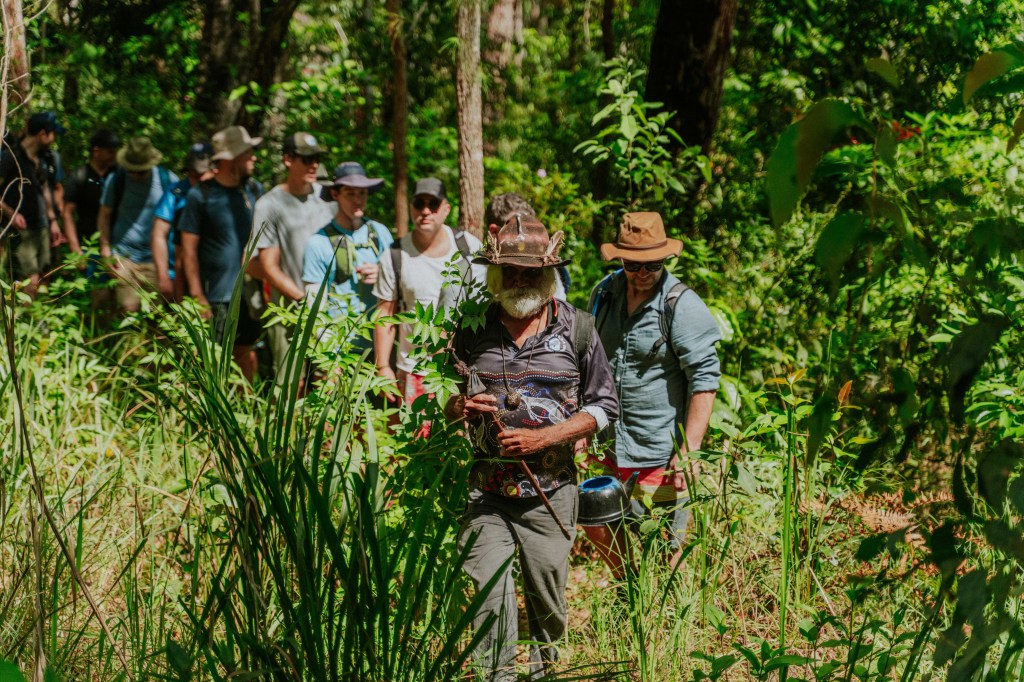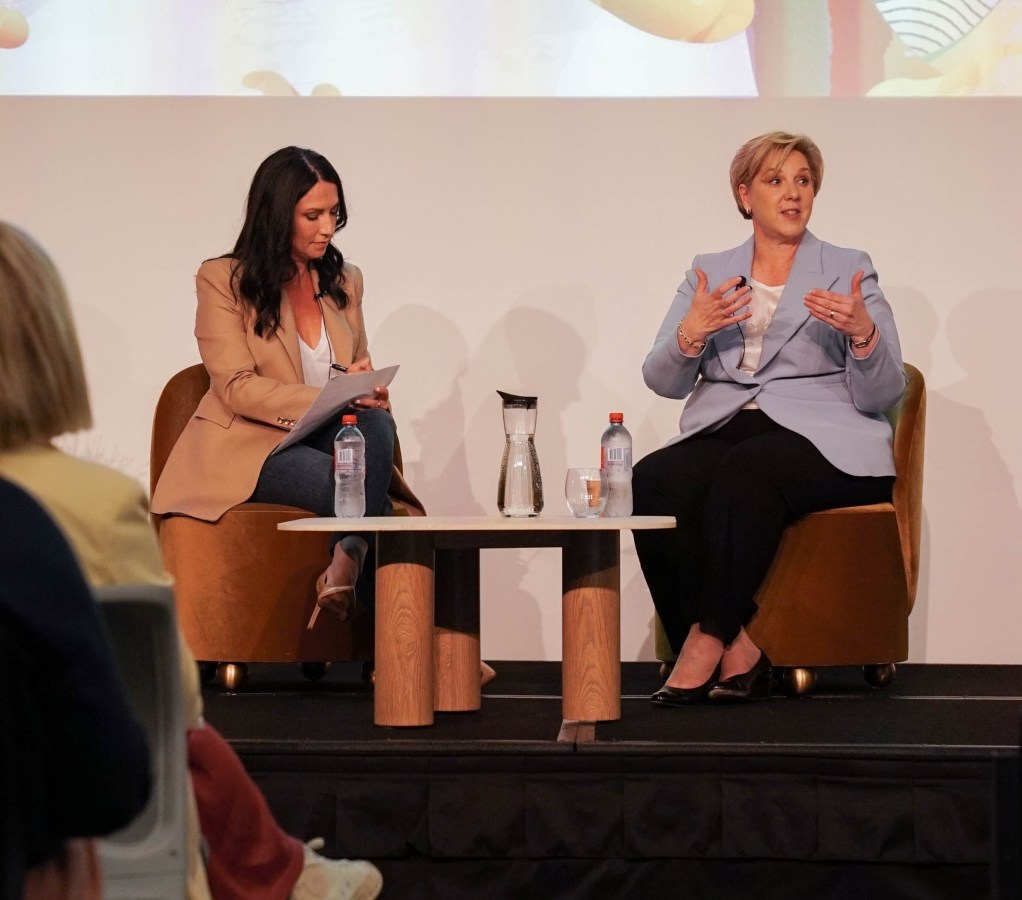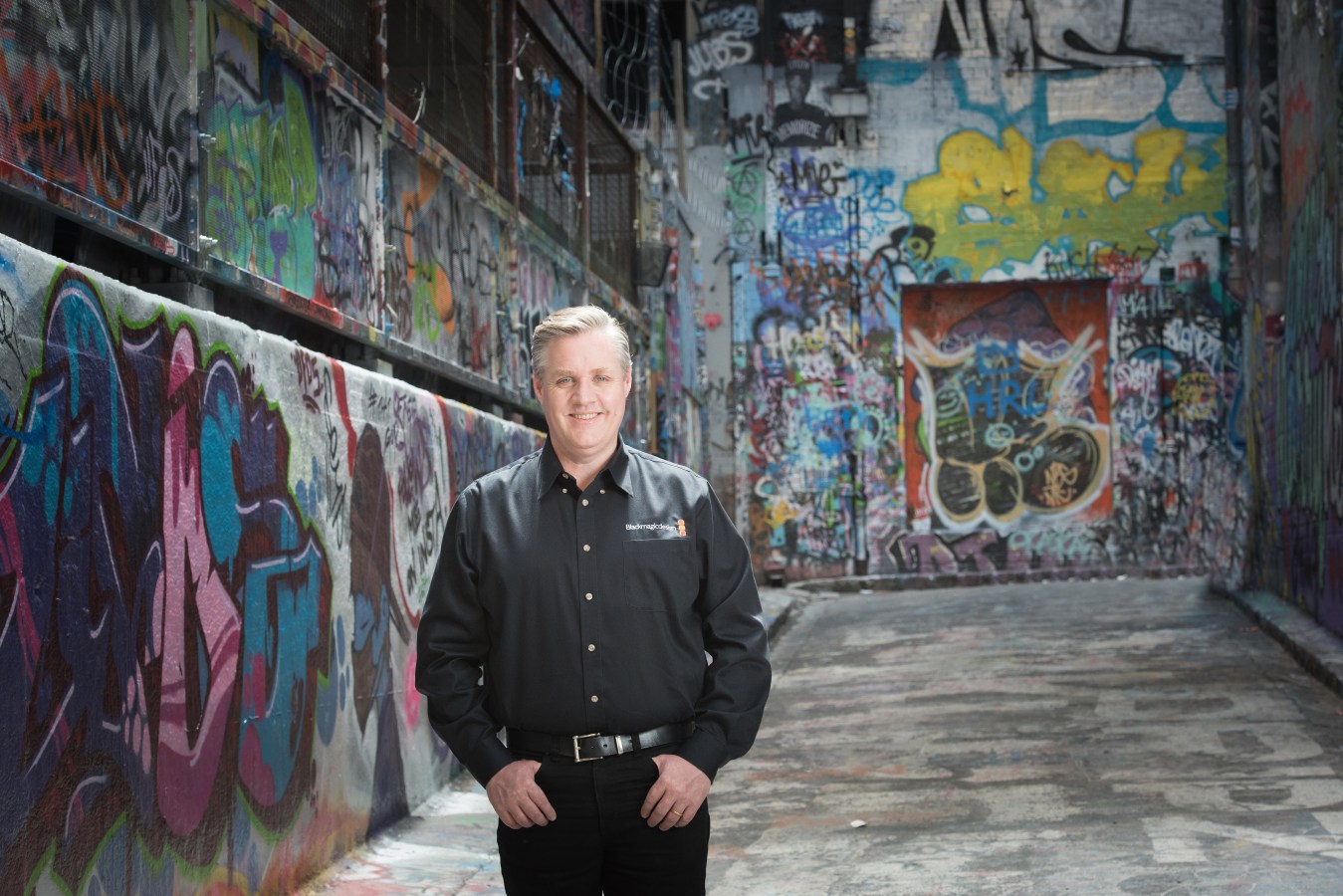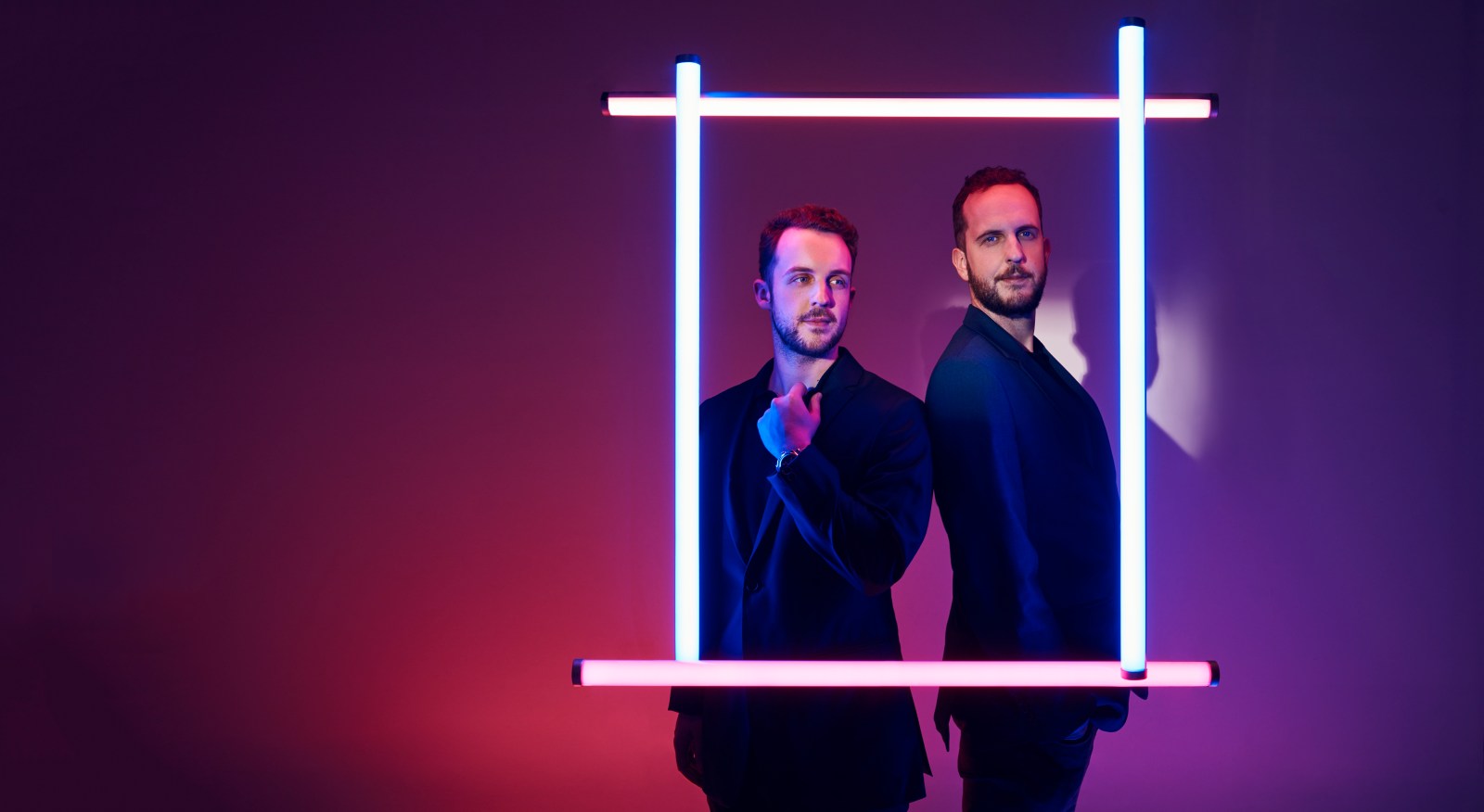The Summit community is an elite group of high-growth tech entrepreneurs who band together to help each other through the gruelling start-up and growth grind. It is a part of Innovation Bay, which also facilitates communities of VCs and angel investors. In a Forbes Australia exclusive, reporter Shivaune Field joins 30 of Australia’s best and brightest founders, on First Nations land in the Daintree Rainforest.
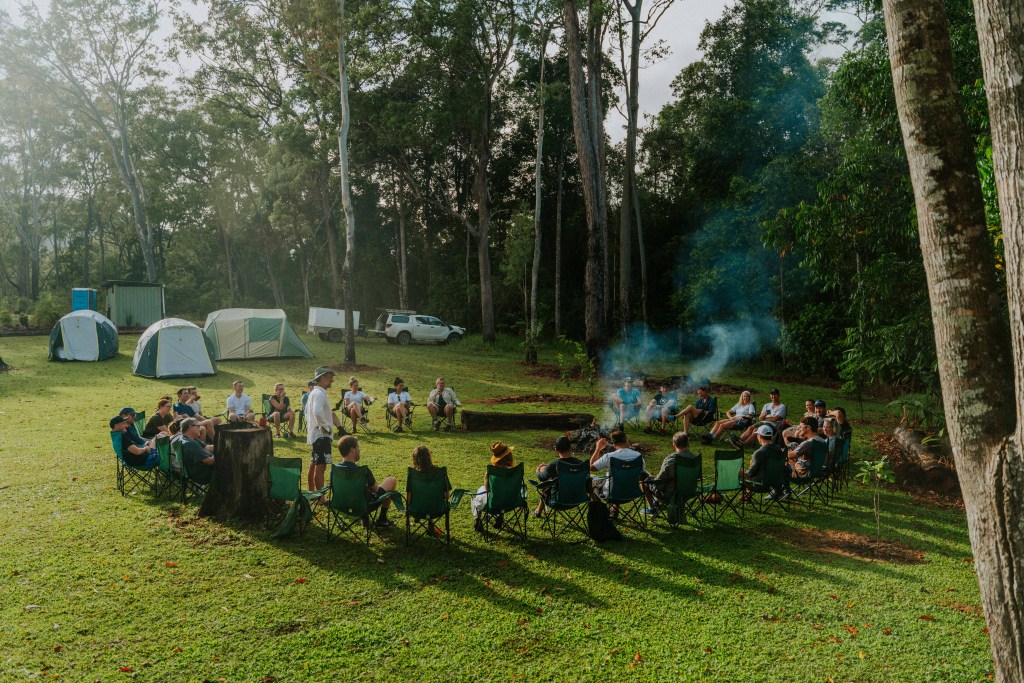
The conversation in the front seats of the Defender ranges from endorsement of a recruitment agency that can refer highly efficient executive assistants, to supply chain headaches, to appropriate metrics for traction and churn. Paula Burton is behind the wheel, navigating the tricked-out 4-wheel drive from paved Queensland roads around Cape Tribulation, onto rocky river crossings leading into Wujal Wujal.
In the passenger seat next to Burton, is Alex Birch. Like his road trip compadre, Birch flew to Cairns airport in Far North Queensland after taking off from Melbourne, where the company he founded is based. The two entrepreneurs chat about the great appreciation they have for their supportive, somewhat neglected partners, before the conversation turns to the lessons in leadership they have learned and implemented in their companies, since becoming parents.
Alex Birch is the CEO and Co-Founder of XY Sense, an AI-driven workplace occupancy sensor and analytics company. XY Sense is the second company Birch founded, and his partner this time around is a star employee from the first. The work-from-home shift that has revolutionised how employees engage with office spaces has been beneficial to XY Sense, as organisations across the world need data and metrics to evaluate the ROI on leasing offices.
Paula Burton’s focus is less real estate and more advanced science. She is the Co-Founder and CEO of Mass Dynamics, headquartered in Victoria. Burton started the company almost five years ago, and says she is proud to be making a global impact in the fight against disease.
Mass Dynamics optimises the study of proteins (otherwise known as proteomics) using a process called mass spectrometry. Bioinformatic data is consolidated in the cloud, enabling it to be analyzed and shared with the research community.
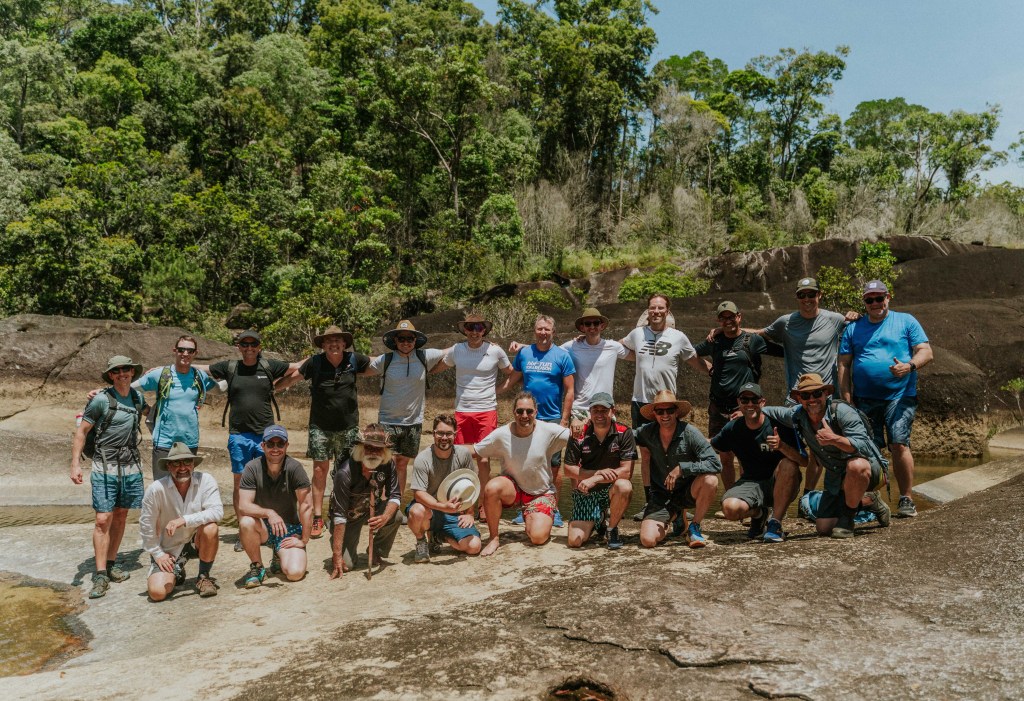
Burton studied Computer Science at Monash University and describes herself and her Mass Dynamics team as ‘mass geeks.’ Prior to starting the company, she worked as a consultant and credits that experience with equipping her to think ‘one step ahead’ of what is happening in her company. She likens entrepreneurship to a game of chess, an analogy that her road-trip co-pilot, Birch, nods his head in agreement to.
These moments where entrepreneurs can talk candidly about the journey they are on with other people going through the same thing, are rare in the day-to-day life of these founders. Which makes them all the more valuable when they happen.
The two entrepreneurs who founded Innovation Bay understand the grind well. Ian Gardiner and Phaedon Stough started the first ‘community’ in 2003. Back then, communication consisted of an email from Gardiner to Sydney-based founders suggesting a Friday afternoon drink at a bar.
In the 20 years since its inception at the Home nightclub in the Cockle Bay precinct of Darling Harbour, Innovation Bay has expanded from connecting founders, into also connecting groups of Australian investors. Today, there are 200 members who stay connected through events, podcasts, and a dedicated newsletter. Members are divided into four separate communities.
Early-stage founders are a part of the ‘Canopy’ community, whereas later-stage founders and CEOs — typically with revenue in excess of $20-million a year — form the ‘Summit’ community. The angel investor group is known as ‘Horizon’ and the VC investors are called ‘Aurora.’
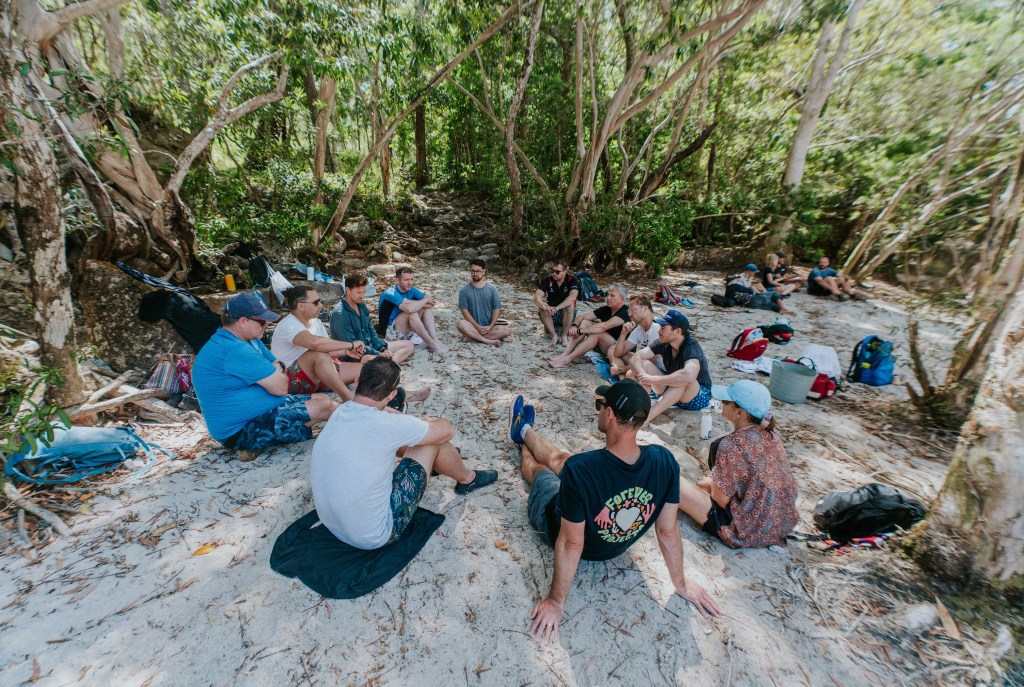
Each community has a dedicated leader and a Whatsapp group enabling instant digital connection. The founder communities have a monthly two-hour online session for groups of around 8, known as forums. Once a year, members can attend an all-expenses-paid annual ‘Expedition’ to a unique location. On the four-day intensive retreats, bread is broken, tears are shed, and lifelong bonds are created.
It is on day one of Summit’s 2023 Expedition, that I find myself in the backseat of the Defender, listening in to Birch and Burton discussing their companies, and how invaluable these trips are to them. They explain to me that founding a company can be a lonely business.
Both Burton and Birch are married to spouses who wholeheartedly support their ambitions. Another commonality between these two founders is that they have both recently been through capital raises – Burton a seed round and Birch an A+ round. They discuss their experiences fundraising, and Burton asks Birch for advice on how to approach a future round.
Having VC partners is an invaluable source of guidance, advice, and counsel they say. And their employees are a vital avenue to collaborate with and bounce ideas off of. But while it’s these stakeholders that keep their calendars highly scheduled and full, it is the input, recommendations, and camaraderie of other founders that they don’t have time for.
They tell me going off the grid with fellow entrepreneurs who understand their daily battles, renews their vigour and focus to continue hurtling down the founder’s path.
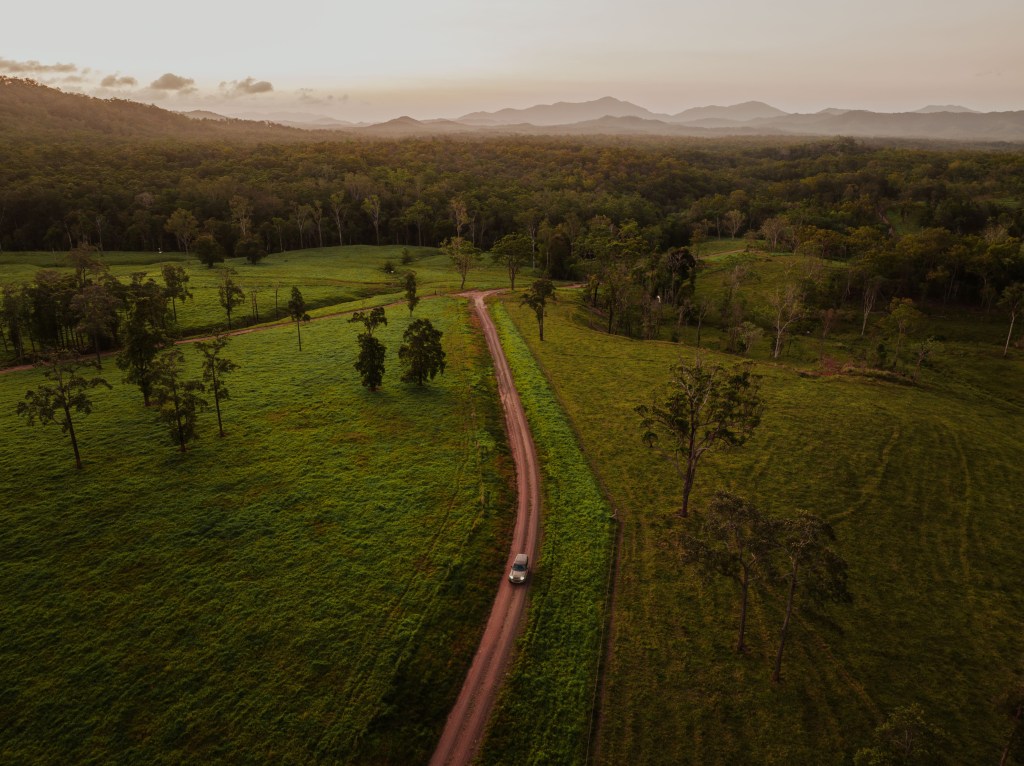
“It’s just this incredible, incredibly challenging roller coaster on a founder journey,” Innovation Bay co-founder Ian Gardiner tells me. “And that’s the reason that they join Summit, because the only people that understand that roller coaster journey, are other founders.”
Gardiner has himself run the entrepreneurial path. Before getting Innovation Bay off the ground, he founded video platform Viocorp and was its CEO for 12 years. The video streaming company sold to a VC firm established by Fairfax’s David Kirk in 2014. Gardiner then joined Amazon Web Services. He ran its Startup business in Australia and New Zealand for the next four years.
His time at AWS required Gardiner to develop relationships with and build out the region’s nascent startup scene. It also dovetailed nicely with the founder network he was creating at Innovation Bay.
“Amazon allowed me to meet everyone in the community and build good relationships with them. And that really was helpful. I left in 2018, to double down on Innovation Bay, and join Andrea at Jelix,” Gardiner says.
Andrea is Andrea Gardiner — the founder, CEO and CIO of Jelix Ventures, a VC fund based in Sydney. She met Ian while running the corporate banking division at the Bank of Scotland, in her soon-to-be husband’s homeland. In 2002, the Gardiners relocated from Scotland to Australia, where Andrea was born. Andrea was a part of the Viocorp board, when she left in 2015 she started Jelix Ventures, which is now an $30 million active seed-stage VC fund.
Gardiner notes that having avenues to connect founders with VC and angel investors, is a part of what makes Innovation Bay so powerful in turbocharging Australian startups. He points to Immutable co-founder James Ferguson as an example of that.
The NFT company was last valued at $3.5 billion. Immutable founder James Ferguson was a part of the first official Summit community. Immutable raised a USD$2.4 million seed round in 2018, and one year later a USD$15 million series A.
Having access to capital is particularly important to tech companies looking to scale, Gardiner says. While Jelix Ventures did not invest in Immutable, it does have investments with 6 other Summit communities.

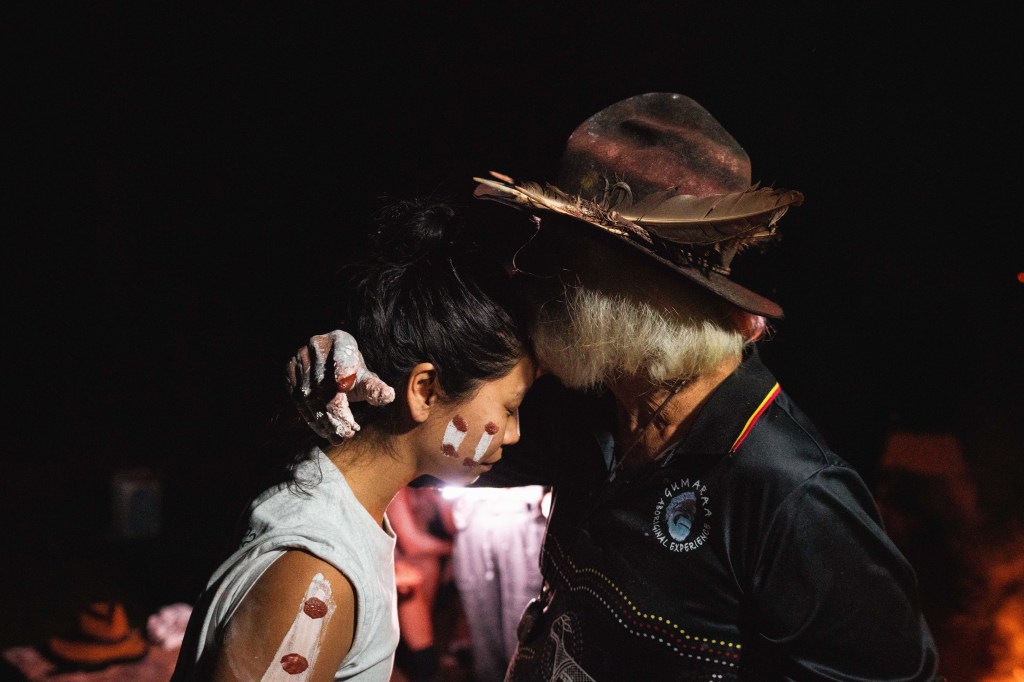
“In order to build a great scalable tech product, you have to invest a lot in engineering. So when you’re a high-growth tech founder, the first thing you do is raise money. The second thing you do is use it to hire people,” says Gardiner.
Having networks of people at the top of their game is an advantage for hiring, too.
Innovation Bay is loosely based on the Young Presidents Organisation (YPO) model, which unites more than 30,000 global members in 142 countries. There are 17 chapters in Australia alone, according to the YPO website. Gardiner himself is a YPO Sydney member. What Innovation Bay offers that YPO doesn’t, however, is an orientation around technology.
“The best founders are driven by a purpose beyond just making money. They have to stretch. We think they are the absolute top of the pyramid, they are the gladiators in the field.”
Ian Gardiner, Co-founder of Innovation Bay
“We have an exclusive high-growth tech focus,” says Gardiner. “It’s also just founders in our group. We’re not going to have bank CEOs or family offices or family-run businesses in the Summit group. All of our founder members are high-growth, technology-focused founders.”
Gardiner says he and his co-founder Stough, who is the CEO of Innovation Bay, want the community to be a place of knowledge transfer, and be a part of a legacy that future founders can benefit from while pushing forward to build the companies of tomorrow.
“It’s going to be an incredibly stressful journey,” says Gardiner. “It could cost you money and health and relationships along the way. The best founders are driven by a purpose beyond just making money. They have to stretch. We think they are the absolute top of the pyramid, they are the gladiators in the field.”
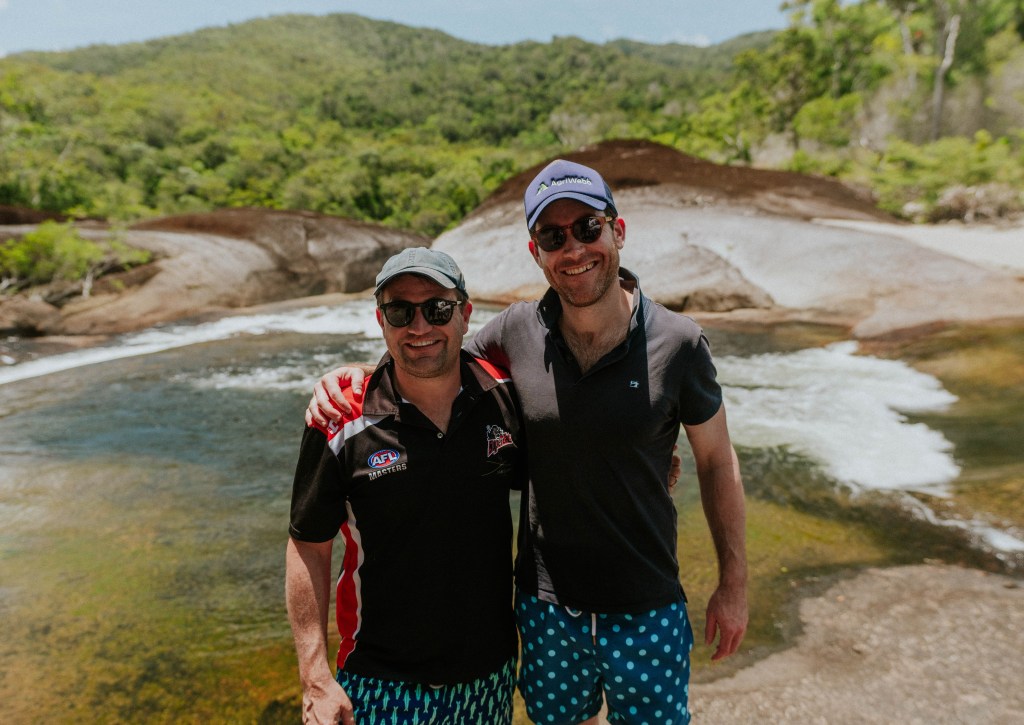
Up until 2019, sponsorships from corporations like AWS where Gardiner worked, paid the bills at Innovation Bay. The organisation shifted to a member contribution model four years ago.
Founders now pay $7,500 a year to be a part of the community. In the economic downturn that has seen companies pull back on sponsorships, it was a necessary step in order for Innovation Bay to grow, Gardiner says.
Phaedon and Gardiner have big ambitions for the future of the founder and investor communities. They hope to have 600 members within three years, and to solidify Australia as a globally recognized destination to start a thriving business.
“We want to positively impact the whole startup ecosystem. Wouldn’t it be great to be like Silicon Valley, or London or any of those major hubs? And we’re not quite there, but it’s getting better,” says Gardiner.
To become an internationally renowned country for tech innovation, Gardiner says the Australian government could provide assistance by doing two things.
“Provide encouragement, and occasional bits of support for those that are doing the meaningful work.”
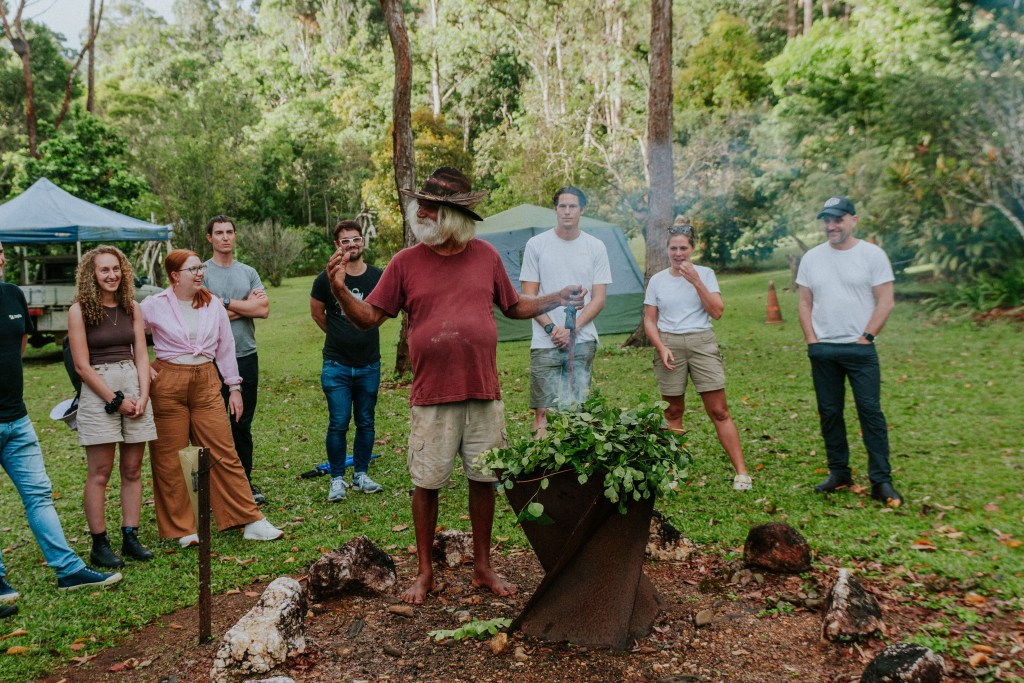
Lighting the fire for tech innovation
Research into building innovation ecosystems confirms the efficacy of governments providing some funding, as a match to light the kindling.
“We have entered an era of innovation by ecosystem,” a Deloitte report on the government’s role in innovation reads. “Government should have a new understanding of how innovation happens and a new set of tools. Today, innovation is… like building a fire in a storm. The stage needs to be carefully set, a match set to it, and then the delicate early flickers nurtured until they become a self-sustaining blaze.”
The fire analogy seems apt, as Burton, Birch and I pull into the Yindili camp on First Nations land where the Summit community will sleep tonight. We jump out of the car and spot the campfire that is ready to be lit by indigenous elder CJ, who resides on the property with his family. Our immersion into Indigenous culture begins with a traditional welcome-to-country ceremony.
In addition to the 30 founders on this trip, the circle we form around CJ includes investor Dr Catriona Wallace, of Channel Ten’s Shark Tank fame. Dr Arne Rubinstein, who specialises in leading groups through Rites of Passage ceremonies, has joined the Expedition too. Both were invited through Sabbatical Travel, an entity that partnered with Innovation Bay on programming. Red Earth — an organisation that fosters relationships with First Nations elders and enables groups to learn from Indigenous communities — is leading the trip.
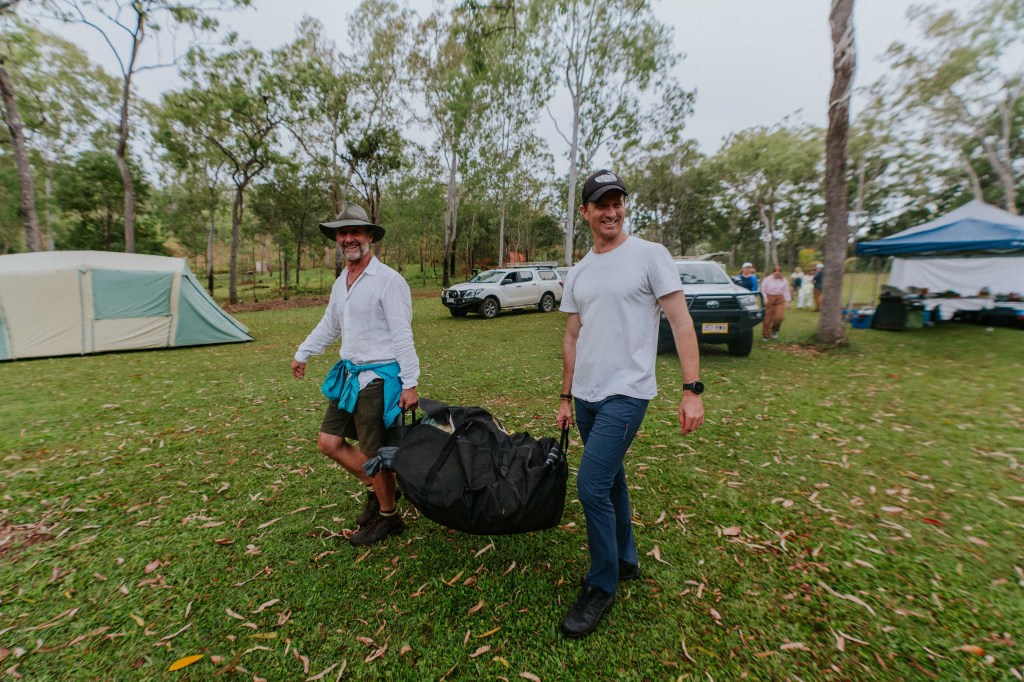
As the sun sets, we set up tents and prepare the evening meal. We are deep in the Daintree Rainforest, without mobile service, electricity, and showers.
I get talking to John Fargher, a co-founder of Agriwebb, while he browns the onions that will sit atop our steak sandwiches. Fargher and his two co-founders started the livestock management software company in 2014. In less than 10 years its value has exceeded $100 million, by digitizing farm records in Australia, Brazil, the U.K. and the U.S.
We sit in camping chairs and eat dinner on plates on our laps, faces aglow from the campfire. Arne — as Dr Rubinstein likes to be known — leads a workshop on personal transformation after the meal. I give the founders some space as they form small groups to share personal stories on the rites of passage they have been through.

Sitting close to the kitchen tent and an urn of hot tea, I start chatting to Jason Hosking, a co-founder and the CEO of Hivery. His company uses AI to improve the placement of products in vending machines and traditional retail environments, and increase sales. Hivery raised a $30 million Series B round last year, and was named NSW Exporter of the Year.
We chat briefly before he is called away for an emergency call through RedEarth’s satellite phone. The communal circle around the campfire reforms, and I rejoin the Summit group for a desert of flame cooked damper doused with butter.
We marvel at the clarity of the stars, try to identify the saucepan constellation, and soon retire to our respective tents to get some shut-eye. The stretcher bed is suprisingly comfy and I fall asleep listening to the light patter of rain on canvas.
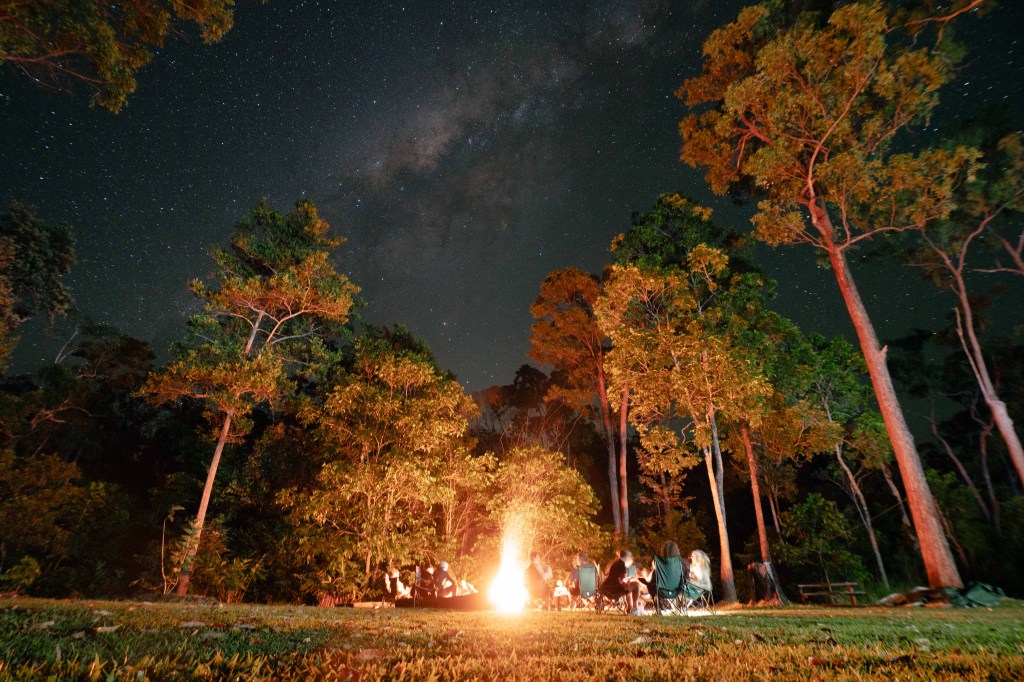
Exiting the tent in the morning, I catch a glimpse of Matt Smith, the founder and CEO of MyPass, returning from a ‘morning bath’ in the nearby brown river. It is the same one we drove through in 4-wheel drives the day before. Smith laughs and assures us it was not only a refreshing dip, but fortunately, in his experience, also croc-free.
Over coffee and a buffet breakfast of barbecued bacon and eggs, we are warned that one of that day’s activities is — croc-infested — fishing. We will be joining indigenous locals to learn the art of casting out and reeling in, and under no circumstances whatsoever should we be within two metres of the waters edge. Leaders from RedEarth tell us that just a week ago, a dog was snatched by a lurking salty where we will be casting out.
Before venturing toward those muddy waters, we are attending a smoking ceremony led by a neighboring Indigenous tribe at the foot of a waterfall. We jump into our Defenders in groups of four, and take great pleasure in motoring through the swelling river crossings dispersed sporadically throughout our hour-long journey to Wujal Wujal.
I am in a car with Gardiner, Smith from MyPass and Sarah Wicks from Innovation Bay, who is driving. Arne suggested we discuss overcoming adversity on the road-trip and we follow his lead. We each share an impactful personal or professional challenge we have faced, and are suprised how effective this prompt is at revealing hidden layers of our characters.
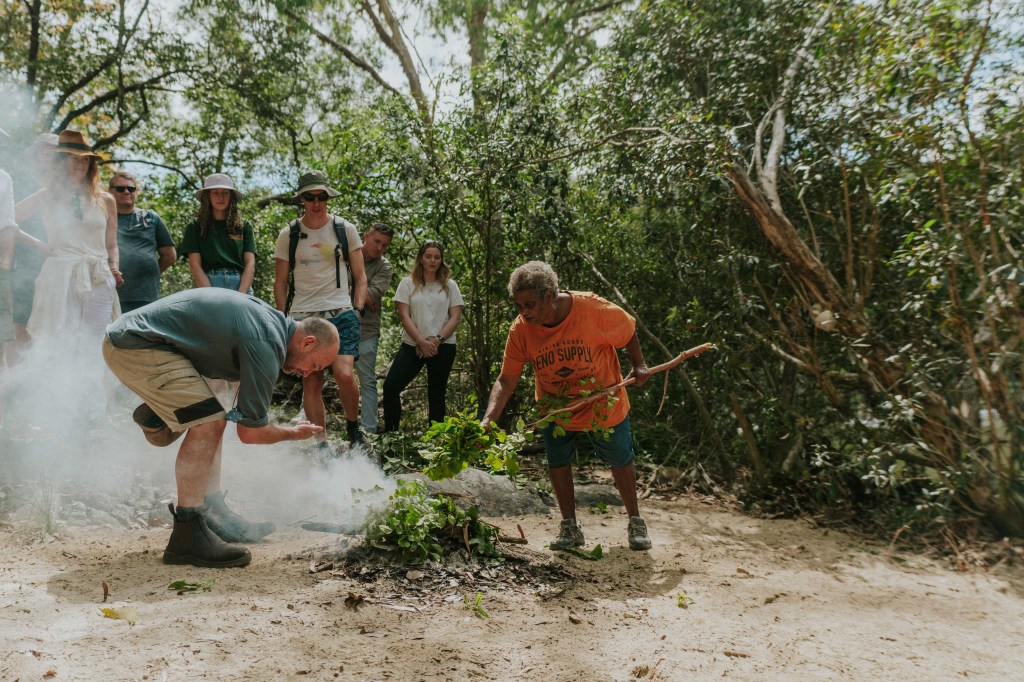
At the foot of the Wujal Wujal waterfall, a female elder from the Kuku-Yalanji clan welcomes us to country. She explains it is customary for visitors to First Nations land to be welcomed with a smoking ceremony. When moving from one clan’s land, or country, to another — even if it is just a short drive away — a welcome-to-country ceremony is undertaken.
We form a line and individually approach the fire. Smoke from green burning fauna engulfs us. We are encouraged to draw it toward our face and then make our way to view the waterfall.
On the short hike over large granite rocks, jokes are made about tripping on an untied shoelace and falling into croc-infested waters. The crashing of water into the lake beneath the falls is loud, and spirits are high as we take in the vista as a group.
On our way back to the cars, someone announces that there is a sliver of mobile phone signal, and we are soon buried in our phones catching up on messages and emails from overnight. A voice from somewhere behind me says that after reading what came in over the last 12 hours, he now feels better about spending the next two days off the grid, knowing that nothing fell apart in his absence.
Next up is the fishing expedition, which I attend with David Harris, the Co-founder and CEO of Guinevere Esports, Cate Hull who started FreightExchange, and Google Cloud’s Tina Tran — a financial backer of Innovation Bay. Our guides are three indigenous women who fish these waters on the weekends, and care for the land during the week. Jose describes herself as a Yalanji woman and says her clan is more than 200 people strong.
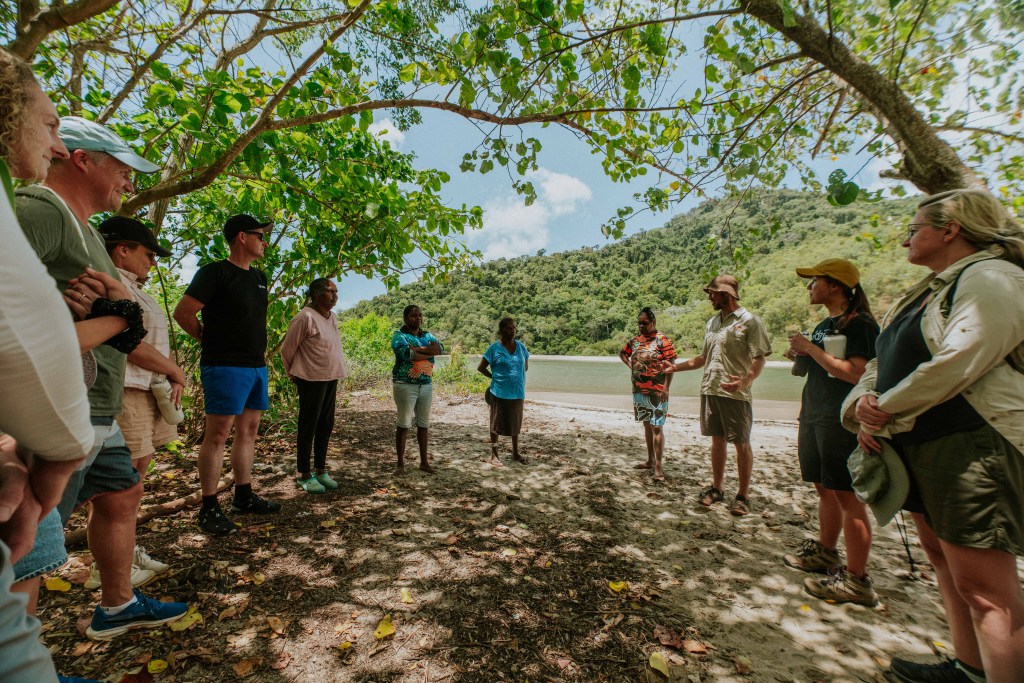
While she shows us how to throw the line in, she talks about her tribe’s connection to this land. I ask about the challenges that this community faces and she says that her greatest wish is for the Yalanji clan to have increased access to education and employment opportunities for their children.
After fishing, we bring Jose and her family members to a nearby picnic shelter to share in the Summit group’s packed lunch. I sit down next to Nick Holmes a Court, who founded BuzzNumbers, and exited from that business in 2013. He has been a part of Innovation Bay for more than 15 years.
“It started with 20 folks around a table who were building SAAS businesses, when it wasn’t widely recognized as a thing to do,” says Holmes a Court. “There wasn’t a big community of people in Sydney that had that experience building tech products.”
Today Holmes a Court is the Venture Capital Manager at AWS, and a member of Innovation Bay’s Summit community. He is also an Investor and adviser at Startmate, an accelerator based in Sydney. Holmes a Court splits his time between the Australian startup ecosystem, and the epicentre of global innovation in the Bay area of California.
After lunch, we relocate to a park and sit in a circle led by Arne. The founders are asked to share an immense challenge they are facing, either personal or professional. The responses are raw and show great vulnerability, candour and trust from the 14 Summit participants.
The Defender challenge
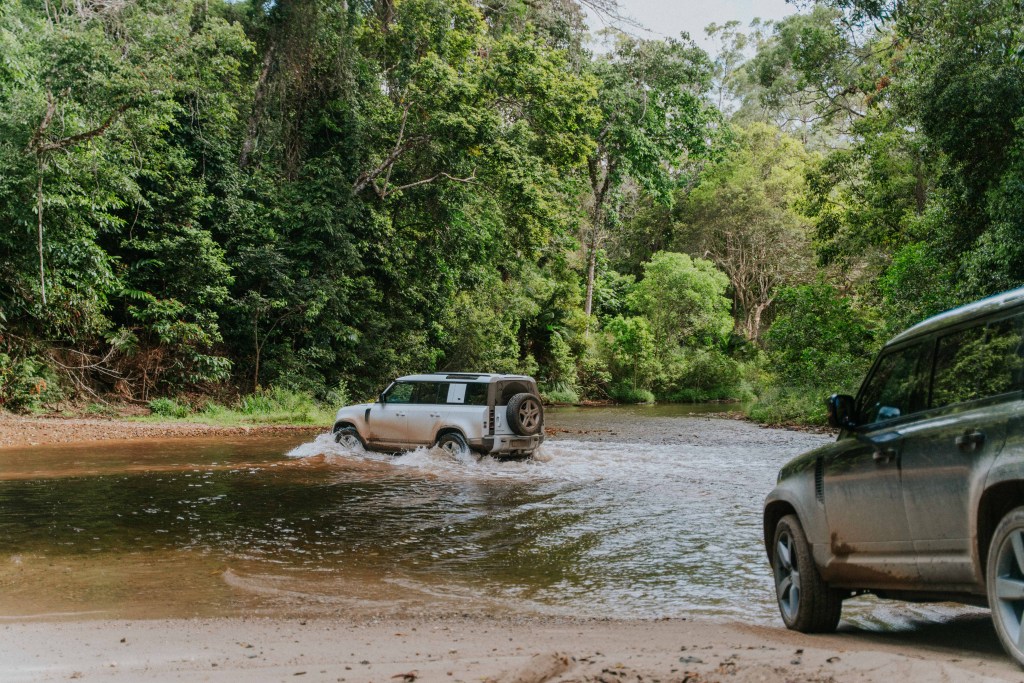
The final activity before I leave the immersion, is a driving challenge put together by the Defender experience team. The fleet of Defenders provided to Innovation Bay for this trip, are about to be put to the test on remote dirt roads.
This time I take the driver’s seat and grasp the wheel with one hand, the walkie-talkie connecting me to the JLR off-road driving instructor with the other. I am joined in the car by Innovation Bay’s head of partnerships Hayley Rynehart, who put the deal together for JLR to partner with Summit.
We climb a steep hill and I hit the gas. Hayley and I chat about what is needed to scale Australia’s startup community into something like what is found in California where we have both observed enormous growth over the past twenty years. As we leave the canopied mountaintop on an uneven dirt road, I’m instructed to switch the Defender into hill-descent mode, to get a feel for how it can autonomously control the brakes and maintain safety and balance on a steep decline.
I ask Rynehart her take on why building community is so important in the Australian entrepreneurial ecosystem. Having spent more than a decade in the U.S. connecting innovators to thought leaders like Oprah Winfrey, Esther Perel, Jamie Foxx, and Diane von Furstenberg, Rynehart understands a thing or two about building community.
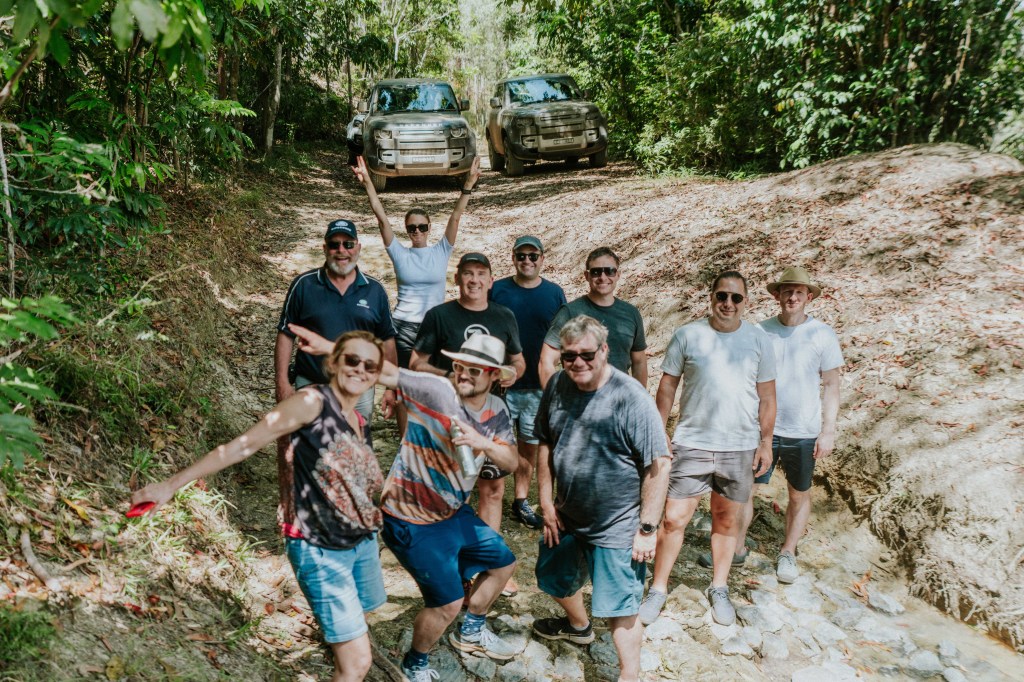
At the heart of every human is a need for connection, to be understood, and to share experience, she tells me. And that’s true of a billionaire, a C-suite executive, an investor, a worker bee, a retiree, or a founder.
And with that, my 36-hour immersion into the pinnacle of Australia’s founder community expires, and I traverse rivers, a ferry, and dirt and bitumen roads to get to the hotel in Cairns, and a much-needed, croc-free, ceramic bath.
Look back on the week that was with hand-picked articles from Australia and around the world. Sign up to the Forbes Australia newsletter here.
